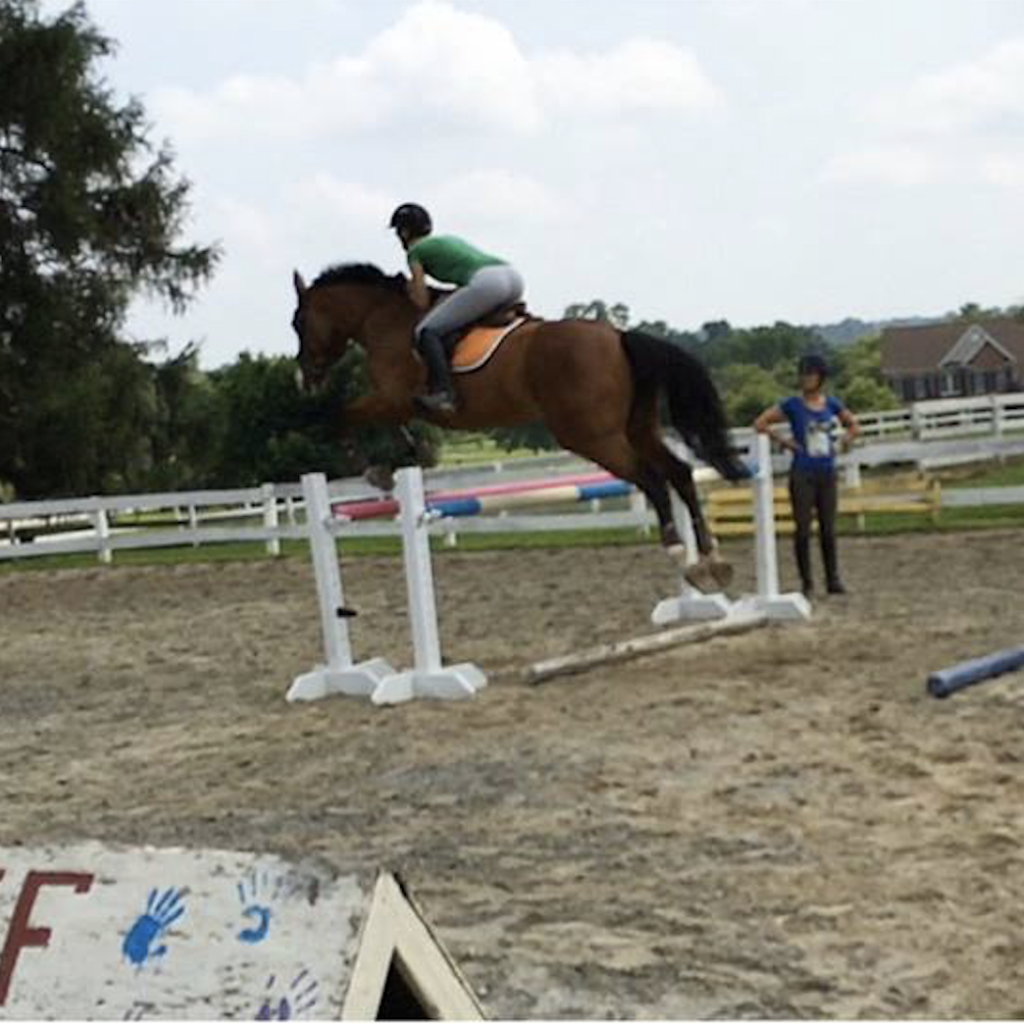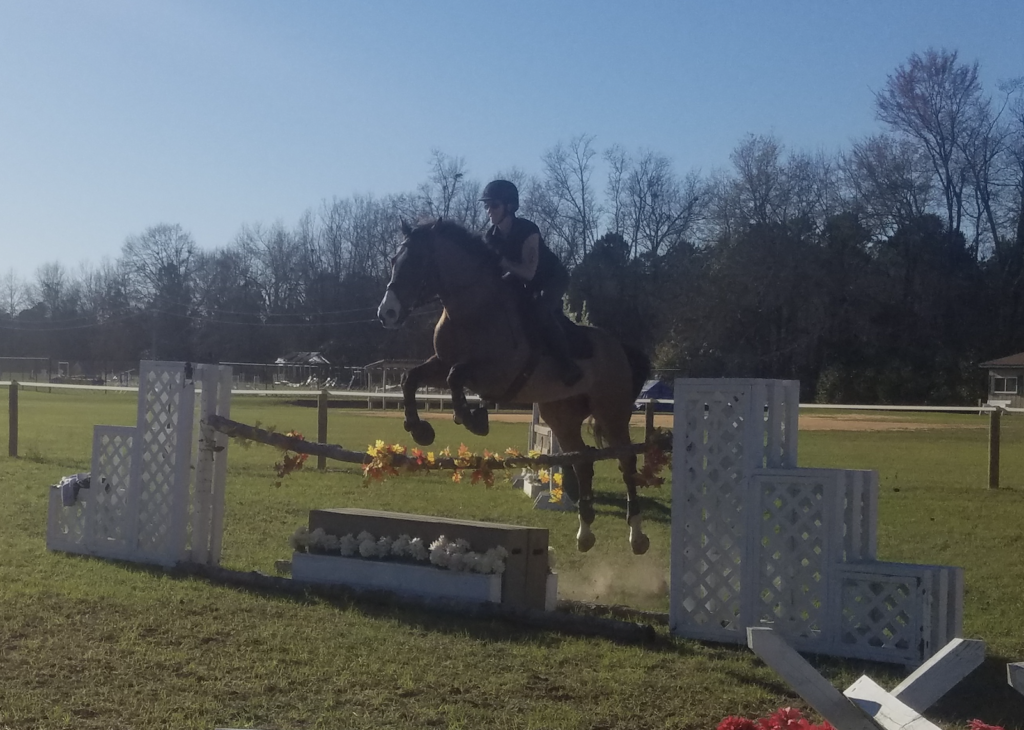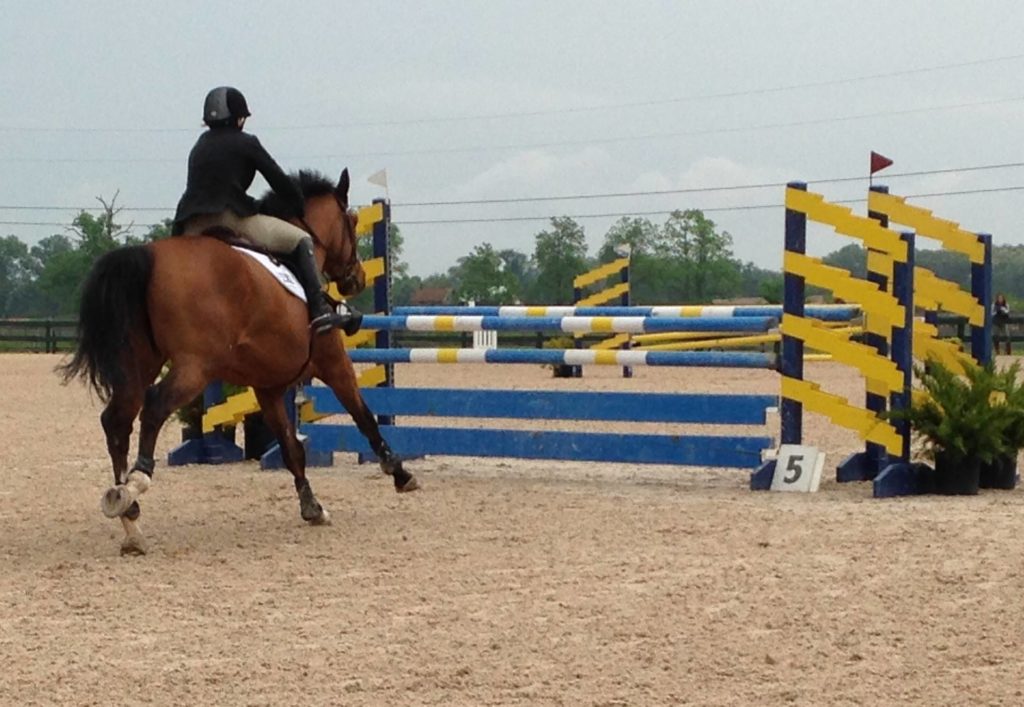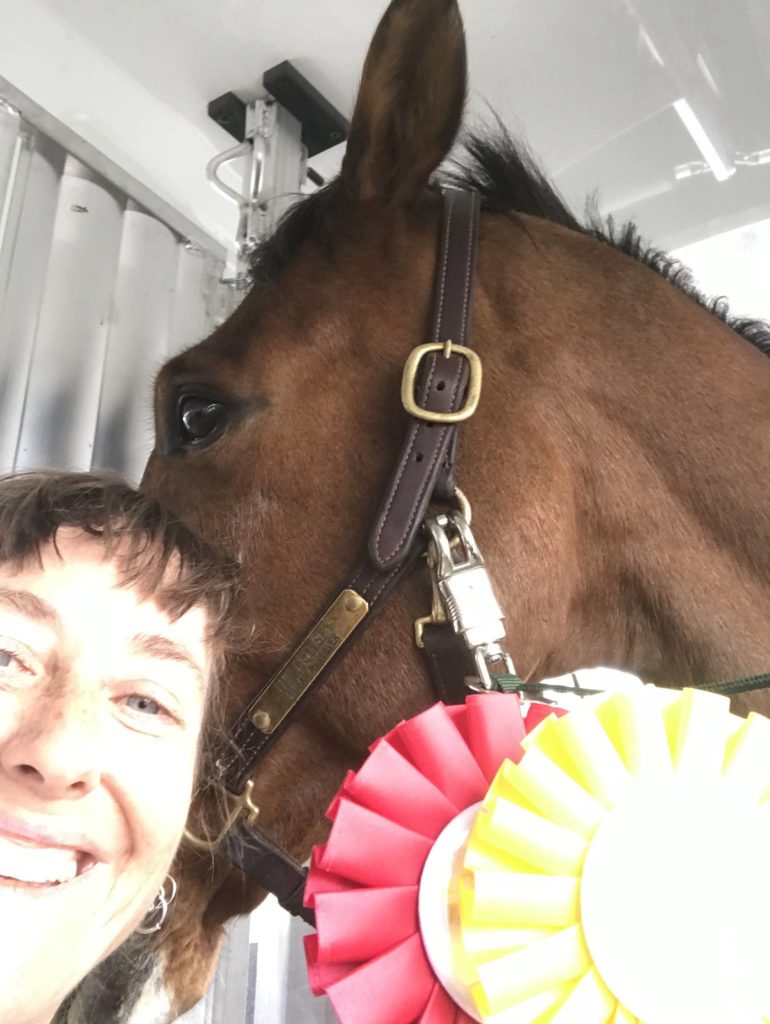What kind of program are you in? Are you the one who lays awake the night before a lesson or show day, worrying about everything, including whether or not your horse is getting enough sleep, looks like a deer in the headlights in or out of the tack, and hangs breathlessly on your trainer’s every word, hoping some of their confidence magically seeps into you? Or are you the one who has all the (misplaced) confidence anyone could want, blithely galloping around the ring while your friends ask each other things like: “Was she supposed to jump that fence?” and “Isn’t that a four stride? Did she just do a three?” Or, are you the stone-cold competitor, calmly walking your course, making your plans (A, B, and C), and executing them perfectly? (Wait: are you Beezie???)
As I move back and forth between the hunter/jumper and eventing worlds, the question of what sort of program is best has become a fascinating subject to me. Does it build your confidence? Do you do best with a completely mapped-out structure, do you thrive by designing your own, or are you somewhere in the middle?
The issue with even considering this question is that so much of what a rider needs is relative. A beginner should have more structure, but some need hand-holding, psychologically, more than others. Additionally, some personalities are plain unteachable or unwilling to put themselves into another person’s hands. This is the truth regardless of one’s riding level. I am extremely stubborn and opinionated (surprise!) but I had the luck to have started my riding life with excellent trainers who gave their students the guidance they needed without taking away our agency. I was expected to know how to ride in an under saddle class without anyone other than my mom there wiping my boots and my horse’s nose before we went in. Before over fences classes, at least one trainer was there to school me in the warm up ring, but the amount of micro-management was limited. I distinctly recall one of my trainers yelling that if I didn’t stop chipping to everything, I’d be moved back down to the Children’s Hunters for a year! Spoiler: I stopped chipping to everything.
 Schooling at home with my trainer, Morgan. Photo by Anna Fitzhugh.
Schooling at home with my trainer, Morgan. Photo by Anna Fitzhugh.
A further consideration is the training level of the horse. If the horse is green, is the rider equipped to bring it along or does she need help? Does the horse need pro rides regularly, or just a tune up now and then? Is the rider one who needs the horse to be shown by a pro earlier in the week, or is the horse point and shoot? As a junior, I always had green horses. We couldn’t afford “made” ones, so we bought green and sold them after they had gone through the green divisions with my trainers, followed by the Children’s and Junior’s and equitation divisions with me. On the one hand, this meant that I was often the only one in the Medal class with a five year old (barn name: Bucky). On the other, by the time I got to the show at the end of the week my horse was nicely schooled, had already shown in one or two of the rings, and was settled in to his temporary home.
Another factor that determines one’s program is financial. For many, including myself, being in a big show barn is simply not feasible. Much of why I am a DIY-er and why I have a lot of control over when and where I show is because I need careful planning to make this ridiculously expensive sport an acceptable burden. I am incredibly lucky to have my nice horse and to be able to show at all, so I am not complaining! The reality is that unless you have a certain level of disposable income, you are not going to be able to show year-round, or even every weekend during the regular season. You are not going to be able to board at a barn that charges thousands of dollars every month for full care and training. Those top tier show barns have highly-structured services at home and on the road, and being in that sort of program is simply out of reach for most people.
The program I was in as a junior was not nearly as structured as what has developed today throughout the H/J world, but we had very little say in how our horses were cared for: decisions about their feed, how many and what types of rides they needed each week, who was doing those rides, and the shows we went to were in my trainers’ hands. My mother got a bill at the end of the month with board, training, lesson, farrier, show, and any other fees. This worked out fine; we had a long term relationship with the barn, and our horses did very well in their program. Some people enjoy and need a lot more structure. Others, even within the same barn, need or want less.
Trainers themselves need to decide how in-depth they want to make their program. Is it more general, with X lessons a month, Y training rides, Z number of shows? Or do they offer a bit more flexibility and craft personalized programs for each horse and rider combination? Do they leave the decisions about training and showing largely up to the rider and are there mainly as support? Again, finances, rider and horse level, and the trainer’s own style of management and goals for their operation are going to play important roles in determining where each of us lands on this subject.
Today, I cannot imagine being in even that more limited program I was in as a junior. When I first began riding again and boarded at a H/J barn, the focus was almost entirely on hunters, and I ended up needing to craft my own plans for jumper showing. I bought my own trailer in part because the horse I had at the time was a hateful being and liked traveling solo, and in part because if I wanted to go to a jumper show I was often on my own. Eventually that trainer moved and sold his farm, so I was thrown even more into a DIY situation. I wound up, through some twists and turns of fate, riding and boarding with eventers, the original DIY-ers! This has been both good and bad, and I have to plan and organize nearly everything to do with showing by myself.
 Steve and me. Photo by Rachel Videla.
Steve and me. Photo by Rachel Videla.
Every now and then, I meet up with H/J trainers at some of the bigger shows so they can help me at the ring. One thing that has become clear is that I have developed coping strategies that don’t fit well into the usual H/J program (or, they just aren’t as common). For example, I generally take a picture of the course map, watch a few people ride it if possible, walk it, and then obsessively memorize it in the sometimes hours I have to wait (see my article about ride times!) before my first class. By the time I am ready to warm up, I have a picture of the course in my head and I have a plan for how I will ride it, as well as how I will ride the jump off if that is part of the class. If I have my eventer trainer there, she is often riding a horse or two herself, so we can compare notes, talk about strategies to the questions asked by the course designer, and then she gives me my orders. These are pretty much always some variant of: Get in there and make sure he is awake! GALLOP! Halt! Back up! And then GO!!!
My experience with the wonderful H/J barn I sometimes meet has always been great, but I have to adjust my own meter somewhat. Walking the course is an education in how the trainer wants me to ride it, and practically every stride is mapped out for me. Independent thinking is not encouraged, nor is making one’s own plan for the jump off. I once decided to leave a stride out in a line coming home if we got a good jump in; we did and it worked out beautifully. The trainer I was working with told me I nearly gave them a heart attack when I did that, as we hadn’t discussed it beforehand. It was a gamble and I can see why they were startled, but I’m no longer used to putting everything into the hands of someone else. I’ve become the proverbial square peg, like it or not.
Is this a good thing? What sort of program would be best for me and Steve? I don’t really know, although there are many times when I think I’d progress faster and do better if I wasn’t the one making most of the decisions! Part of my move away from that type of system is simply financial, which is of course going to play a role for most of us. I can’t afford to be in a big show barn with everything that generally comes along with that structure. I’m lucky to work with an incredibly talented trainer, but she can’t always come to my shows, as she has events throughout the season. Most of the time this is fine, but sometimes I absolutely need more help. Last year, I made a decision in a jump off similar to the one I talk about above and it 100% did NOT work out!
To circle back to one of the questions I ask in the beginning, that poor decision didn’t help with my confidence, or Steve’s, and I found myself floundering because I wasn’t sure how to get us back on track. The answer, it turns out, was to gallop (sigh, it’s always the answer for us), but had I gotten input from a professional in the first place, I have the feeling I would have been able to avoid the whole thing altogether.
 Taking a long spot that day I floundered! Photo by Jaime Loichinger.
Taking a long spot that day I floundered! Photo by Jaime Loichinger.
As I think about our return to showing, I’m also trying to learn from these lessons. There are a lot of things I can do on my own: I know my finances and my non-riding responsibilities, so I decide my show schedule. I have a very good understanding of Steve’s fitness level and what he needs to be properly legged up for competition, so I can also make our pre-show prep schedule on my own. I have my own rig and I know how to care for my horse, so those decisions are all in my hands. What I do need help with is a pro’s understanding of how best to warm us up, and how best to send us in the ring with a solid plan, and some backup ones, too. I don’t need to be told how to ride every stride, but input on how this or that question should be tackled is important because I don’t always make the best decisions, as we have seen!
 A successful move up! Photo by Susan Glover.
A successful move up! Photo by Susan Glover.
What program suits each of us and our horses best is complex, but we ammies generally have so many other things going on that sometimes it’s easiest to trust someone else, particularly since it is their job to do this work. As we get ready to return to the show ring, it seems like a good time to ask ourselves what we need to succeed. If the program you are in allows you and your horse to meet whatever goals you have and you feel happy with the results, well…that is the best one for you. Trainers shouldn’t be expected to be miracle workers (although…wouldn’t that be nice?) but they are an important resource, and finding one whose program suits you can make all the difference in the world. I’m going to tweak mine a bit and hopefully we will get back in the ring ready to GO!
